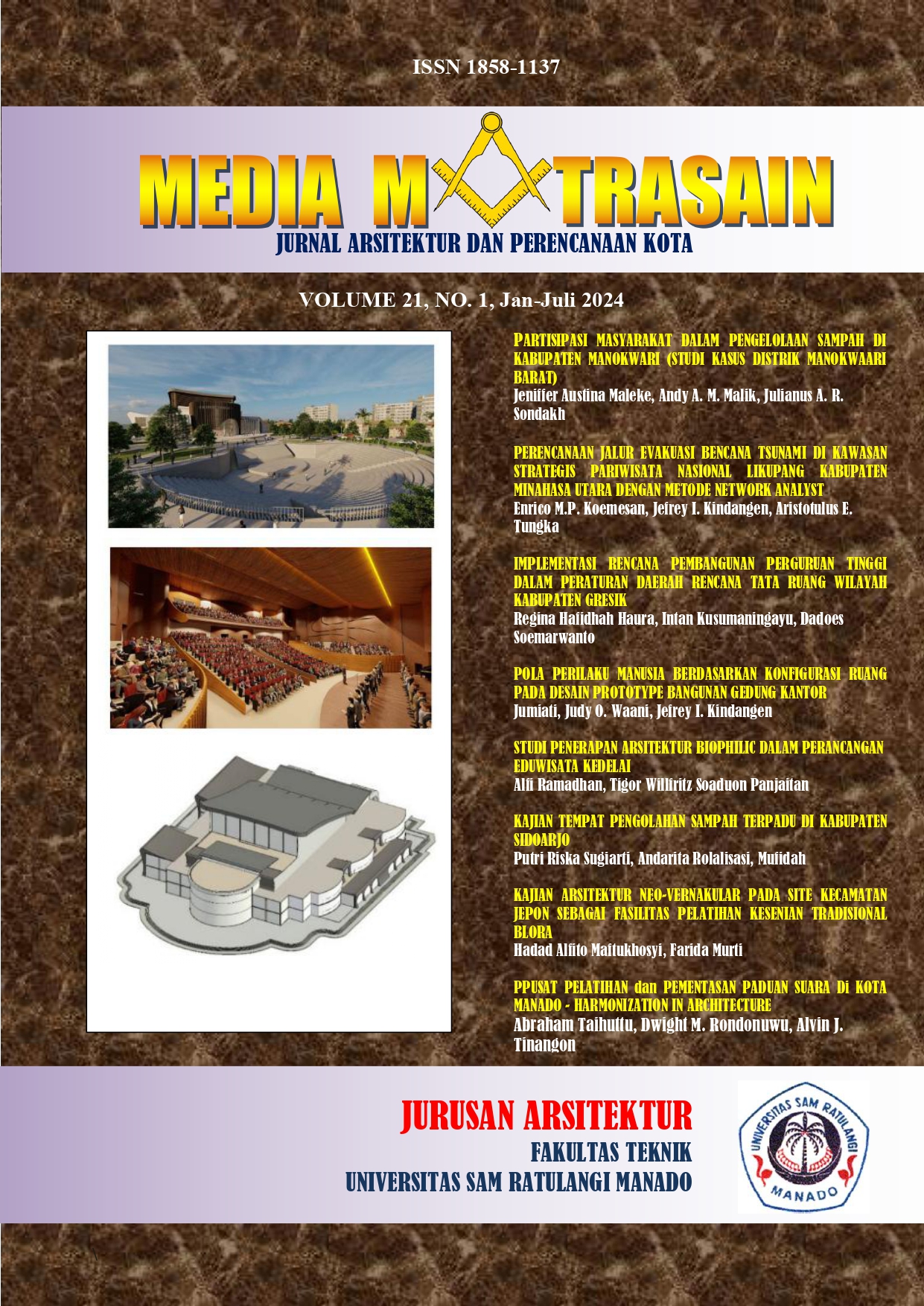KAJIAN ARSITEKTUR NEO-VERNAKULAR PADA SITE KECAMATAN JEPON SEBAGAI FASILITAS PELATIHAN KESENIAN TRADISIONAL BLORA
DOI:
https://doi.org/10.35793/matrasain.v21i1.56072Abstract
ABSTRAKKabupaten Blora memiliki beberapa potensi sosial budaya yang dapat dikembangkan, salah satunya yang berada di Kecamatan Jepon. Kecamatan Jepon ini memiliki potensi kesenian dan tradisional yang melekat pada lingkungan sekitar terutama pada Dukuh Nglobener. Adanya perkembangan zaman di era postmodern menyebabkan lingkungan sekitar site mengalami kemajuan dengan terdapat beberapa fasilitas yang mengacu pada prinsip arsitektur neo-vernakular dengan tetap mempertahankan nilai lokalitas tradisional setempat. Perkembangan pada era postmodern menyebabkan munculnya gaya arsitektur neo-vernakular. Gaya arsitektur neo-vernakular lahir pada tahun 1960-an sebagai jawaban atas kritik terhadap gaya arsitektur modern yang mengutamakan fungsionalisme dan rasionalisme yang dipengaruhi oleh kemajuan teknologi. Arsitektur neo-vernakular berkaitan dengan adaptasi dan perpaduan budaya lokal dalam kehidupan bermasyarakat, norma hukum, serta rasa keharmonisan dan keselarasan antara bangunan, lingkungan dan alam, dengan teknologi.Tujuan dari penelitian perancangan ini adalah untuk mengkaji dan mengadaptasi prinsip-prinsip arsitektur neo-vernakular pada lokasi Dukuh Nglobener, Kelurahan Jepon yang dapat berguna untuk adanya fasilitas pelatihan kesenian tradisional Blora. Metode yang digunakan adalah analisa kualitatif dengan pendekatan metode deskriptif evaluatif melalui observasi langsung, studi literatur tentang prinsip-prinsip arsitektur neo vernakular, pengumpulan data dari sumber lainnya. Pokok pada permasalahan yang akan diselesaikan terhadap objek penelitian ini yaitu, masalah minimnya produktifitas adanya pelestarian dan pengembangan kesenian tradisional setempat yang diterapkan pada prinsip arsitektur neo-vernakular. Sehingga didapat bahwa kondisi site memenuhi prinsip arsitektur neo-vernakular karena masih terdapat beberapa bangunan atau lingkungan sekitar yang mempertahankan dan melestarikan lokalitas tradisional setempat.
Kata Kunci: Arsitektur, Blora, Jepon, Neo-Vernakular, Prinsip
ABSTRACT
District of Blora has several socio-cultural potentials that can be developed, one of which is in Jepon District. Jepon District has artistic and traditional potential inherent in the surrounding environment, especially in Dukuh Nglobener. The development of the times in the postmodern era has caused the environment around the site to experience progress with several facilities that refer to neo-vernacular architectural principles while maintaining traditional local values. Developments in the postmodern era led to the emergence of the neo-vernacular architectural style. The neo-vernacular architectural style was born in the 1960s as a response to criticism of the modern architectural style which prioritized functionalism and rationalism which was influenced by technological advances. Neo-vernacular architecture is related to the adaptation and integration of local culture in social life, legal norms, as well as a sense of harmony and harmony between buildings, the environment and nature, and technology. Therefore, the aim of this design research is to examine and adapt the principles of neo-vernacular architecture in the Dukuh Nglobener location, Jepon Village which can be useful for providing training facilities for traditional Blora arts. The method used is qualitative analysis with a descriptive evaluative method approach through direct observation, literature study on the principles of neo-vernacular architecture, data collection from other sources. The main problem that will be resolved regarding the object of this research is the problem of minimal productivity in the preservation and development of local traditional arts which are applied to the principles of neo-vernacular architecture. So it was found that the condition of the site meets the principles of neo-vernacular architecture because there are still several buildings or surrounding environments that maintain and preserve local traditional locality.
Keywords: Architecture, Blora, Jepon, Neo-Vernacular, Principles



